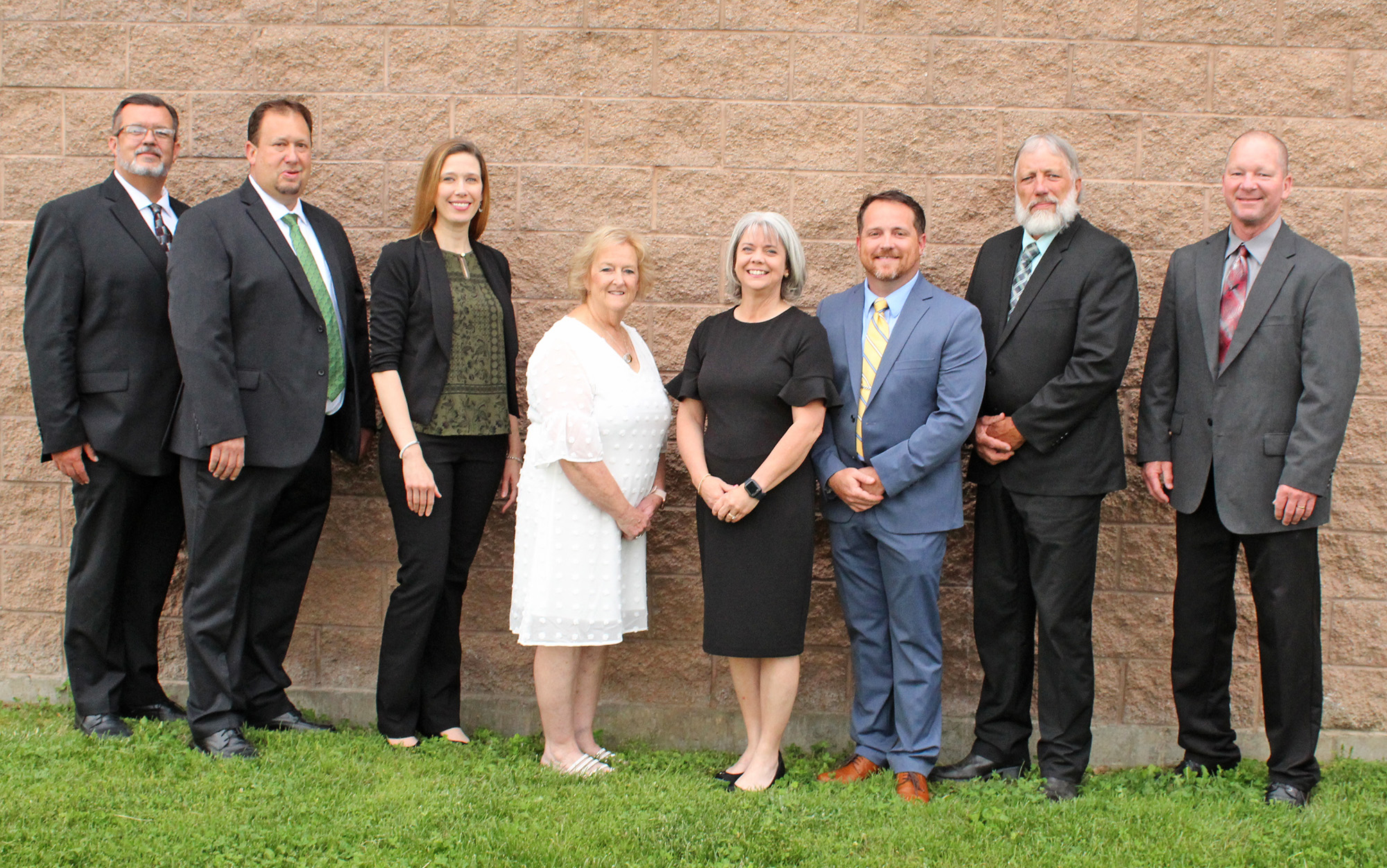Board Meeting Agendas
Board Meeting News
Board Meeting Videos
Board Policies
Climate & Culture Surveys
CSIP
Public Notices
District Report Card
District Financial Statements
District Audit Report
BOARD OF EDUCATION 573-547-7500 Ext. 1329

The Board of Education includes (from left) Jamie Robinson, Vice President Dominic Blythe, Melissa Carroll, President Nancy Voelker, Superintendent Dr. Fara Jones, Glendon Sattler, Kevin Bachmann, and Rich Dix.
Each member is elected for a 3-year term. Those terms expire:
Nancy Voelker - April 2026
Dominic Blythe - April 2025
Kevin Bachmann - April 2024
Melissa Carroll - April 2027
Rich Dix - April 2025
Jamie Robinson - April 2026
Glendon Sattler - April 2026
The Perry County School District Board of Education is comprised of seven elected members deeply committed to ensuring a quality education. They serve three-year terms. Elections are held on the first Tuesday in April, at which time two members are elected to the Board (except every third year when three members are elected).
Board members set policy, approve the district's budget, levy tax dollars to support schools, and approve the payment of budgeted expenses. The Board also acts on recommendations of the superintendent, who is selected by the Board to implement the plans and policies of the Board.
All regular meetings of the Board shall be held at the Old Senior High School on the District 32 campus on the second Wednesday of the month beginning at 7 pm unless otherwise specified in the publicized notice of the meetings.
All Board meetings are open to the public and provide time during each regular meeting for citizens to publicly comment on issues relating to the District's schools.
In the Perry County School District No. 32 the child is the center of all efforts. This principle of education should direct our efforts toward a practical, as well as theoretical philosophy. Acceptance of this philosophy is the first step. Implementation must follow, as well as constant evaluation and revision. Cooperation of parents, teachers and administrators is essential in establishing and maintaining high educational standards for our district.
Contact the Board Secretary at 573-547-7500 Ext. 1329.
SPEAKING AT MEETINGS
Agenda Items
In accordance with law and the district's community engagement policy, district residents may place items on the agenda of a regularly scheduled board meeting as outlined in this policy. The agenda items must be directly related to the governance or operation of the district. The board will not hear resident-initiated agenda items at meetings other than the board's regularly scheduled meeting unless the board president grants an exception.
Residents who wish to place an item on the agenda must first meet with the superintendent or designee to attempt to resolve the issue unless the superintendent or designee waives such a meeting. The meeting will take place within 20 business days of the superintendent or designee receiving a written request to meet. If the superintendent or designee waives the meeting or does not meet with the resident within 20 business days, or if the resident is not satisfied with the meeting's outcome, the resident may submit a written request to the board secretary to add the item to the board agenda.
The board secretary will include the item on the next regularly scheduled board meeting's agenda, subject to the rules listed below, if the resident submits the request to the board secretary at least five days prior to the meeting. Otherwise, the board secretary will place the item on the agenda for the subsequent regularly scheduled meeting. Refer to Board Policy BDDH-1
Rules
The board may move an agenda item to a different meeting with the consent of the resident.
The board may refuse to hear or delay hearing an agenda item if:
The board has heard an identical or substantially similar agenda item in the previous three calendar months; or
The resident has previously violated district rules regarding conduct at meetings or on district property.
The board may delay the hearing of a requested item if more than three resident-initiated agenda items are scheduled for the same meeting. The delayed agenda item will be moved to the next regularly scheduled meeting. If a resident's item is delayed for this reason, the resident will be provided an alternate method of communication with the board, such as submitting written comments.
The board president will make the decision on whether to delay or refuse an agenda item and will communicate that decision to the resident and the other board members. Board members who disagree with the decision may communicate their concern to the board president, request that the agenda item be added, request that a special meeting be called, or make a motion at a meeting for the item to be included on a future meeting's agenda.
The board will place the agenda item in open or closed session in accordance with law and district policy.
The superintendent or designee may invite district staff or other relevant persons to be present during the discussion of the agenda item to address the item and answer questions.
The board will allow the resident five minutes to present their issue to the board unless the board president allots more time to the discussion.
Only resident(s) who met with or requested to meet with the superintendent or designee will be allowed to speak during this time.
If more than one resident seeks to speak on the same item at the same meeting, the board president, at their discretion, will determine the total time that will be devoted to the item and how the time will be shared between the residents. The board president will encourage residents to appoint a spokesperson or communicate their concerns through other means. If the board must limit the number of speakers, it will assign priority based on the order in which the requests were received.
Board members may ask the resident questions, seek additional information from the superintendent or designee, or otherwise discuss the topic.
The board may allow a resident additional time to speak upon the motion and vote of the board.
Any board member who wishes to devote more time to an agenda item may request that the item be put on the agenda for another meeting, which will be voted on by the board.
The board may discuss the public business content of presented agenda items but is not required to decide any matter of public business or formulate any public policy as a result of the discussion.
Public Comment
The board encourages residents to utilize the process for placing items on the agenda but will also specifically designate time for district residents to provide public comments at regular meetings of the board. The following rules will apply to the public comment portion of the meeting:
The board will establish a time limit for the public comment period.
Unless an extension of time is granted by the chairman, each speaker shall be limited to five minutes.
An individual who wishes to speak shall give their name, address and the group, if any, that is represented.
The presentation should be as brief as possible.
No individual will be permitted to speak more than once during this period.
All speakers must provide their name and address prior to speaking.
If there is insufficient time for everyone to speak, the board will encourage participants to submit their questions in writing or utilize the process for putting an item on the agenda.
Seeking Solutions
The board recognizes that situations of concern to parents, guardians or the public may arise in the operation of the district. Such concerns are best resolved through communications with the appropriate staff member, teacher, principal or superintendent.
The following steps are proper procedure:
Matters concerning individual students or teachers should first be addressed to the teacher.
Issues not satisfactorily resolved with the teacher should be discussed with the principal/supervisor.
Issues not satisfactorily resolved by discussion with the principal/supervisor may be brought to the superintendent.
If the complainant is not satisfied with the superintendent's decision, the complainant may file with the board through the superintendent at the next regular board meeting. Upon receipt of a written signed statement of grievance and/or request for a hearing, the board will ask for written reports pertaining to the problem from, (a) the person against whom the complaint is lodged, (b) the school administrator involved, (c) the superintendent, and (d) the complainant, in advance of the meeting.
If the board approves a hearing, the date for such hearing will be set, and the superintendent will advise the complainant.
